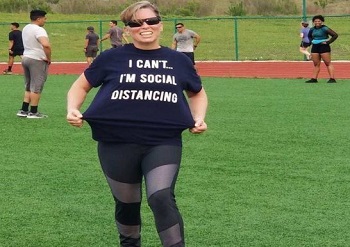 Physical fitness among colleagues or friends can greatly improve social fitness. Army Reserve Master Sgt. Susan Benavidez, an operations non-commissioned officer with the 211th Regional Support Group and Hood Mobilization Brigade, shows off her social distancing shirt during a workout session on March 25, 2020 at Fort Hood stadium in Texas. Soldiers with the brigade practiced social distancing during their fitness sessions. (Photo by Army Staff Sgt. Jasmine Edden.)
Physical fitness among colleagues or friends can greatly improve social fitness. Army Reserve Master Sgt. Susan Benavidez, an operations non-commissioned officer with the 211th Regional Support Group and Hood Mobilization Brigade, shows off her social distancing shirt during a workout session on March 25, 2020 at Fort Hood stadium in Texas. Soldiers with the brigade practiced social distancing during their fitness sessions. (Photo by Army Staff Sgt. Jasmine Edden.)
Perceived social support — an individual’s perception of how and if friends, family members, or other sources might be available in times of need — is one of these factors, said Edwards-Stewart.
“Support from one’s social network is seen as a significant factor that can either help them in times of need if they have a high level of perceived social support or hinder them if they have low perceived social support,” she said.
“In fact, there is research showing that those with higher perceived social support have less mental health concerns, or if they have mental health concerns, they get better faster in mental health treatment than those with lower perceived social support,” she said.
Said Riggs: “It may be particularly important for our military community that so frequently faces challenges to maintaining social connections. Deployments, job transitions, family moves, temporary duty assignments, and many other events that are relatively common to military life can separate us from our social system and make the maintenance of relationships challenging.”
“Social support has been found repeatedly to relate positively to resilience and coping in the face of stress, decrease depression, and general well-being, as well as promoting recovery from traumatic events,” said Riggs. “In addition, loss of social relationships or even the threat of loss can lead to crises including depression and suicide.”
Being socially fit contributes to the Total Force Fitness framework by encouraging a holistic approach to health.
“Each of the elements of the Total Force Fitness framework are important to the wellness, readiness, and resilience of military service members and their families,” said Riggs. “Personally, I think that because social connection is so basic to humans, social fitness is one of, if not the key to overall well-being.
“Maintaining healthy relationships provides the opportunity for emotional growth and exchange, learning, and support,” said Riggs.
Said Edwards-Stevens: “When someone believes that they have individuals who care about them and are willing to help them, they are able to deal with stress more effectively when it occurs.”
In turn, this can promote resilience, which is important for our service members and their families because there are many aspects of military life that produce or increase stress, explained Riggs.
“Being resilient reflects an ability to bounce back and continue to function effectively in the face of such stress,” he said.
Riggs explained that although the precise mechanisms through which social support promotes resilience have not been precisely determined, several possibilities have been suggested.
“In some cases, the support can be pragmatic: A friend can offer me a ride if my car is unavailable or possibly loan me a few dollars, friends and family members can also offer emotional support or a place to vent when I am upset, and strong relationships also offer an opportunity to explore and discuss potential solutions to the problems I am facing,” he said.
Riggs also explained how there is no magic formula for service members to achieve social fitness in the way they can achieve physical fitness through a healthy diet and exercise.
“Successfully and constructively engaging with the people in your world requires ongoing building and refinement of skills, such as communication and problem-solving skills, and a recognition that one needs to apply these skills differently toward different relationships,” he explained. “That is, the ways in which I interact with my spouse are different than the ways I engage with my children, which are different than the ways I interact with a colleague, which are different than how I interact with my boss.
“It is not sufficient to simply gain a set of skills. It is necessary to know how and when to apply those skills in a particular situation.
“Beyond the basic skills necessary to facilitate social interaction, social fitness requires a particular attitude,” said Riggs. “Successful and rewarding social relationships require people to accept, respect, and trust one another.
“Further, relationships benefit from the people involved having empathy for one another,” he added. “That is, being able to see the other person’s perspective, share their feelings, and work to reduce their distress helps to build and strengthen a sense of connection and a healthy relationship.”
Said Edwards-Stevens: “If you feel like you don’t have great relationships, your health will likely suffer in times of high stress. I would encourage service members to pay attention to the quality of their relationships.
“If their marriage feels negative, spend time trying to improve it; if they have no social life, go out and get involved in groups with people who have similar interests; and try to get along with your co-workers as best you can, even if you find them difficult,” she recommended.